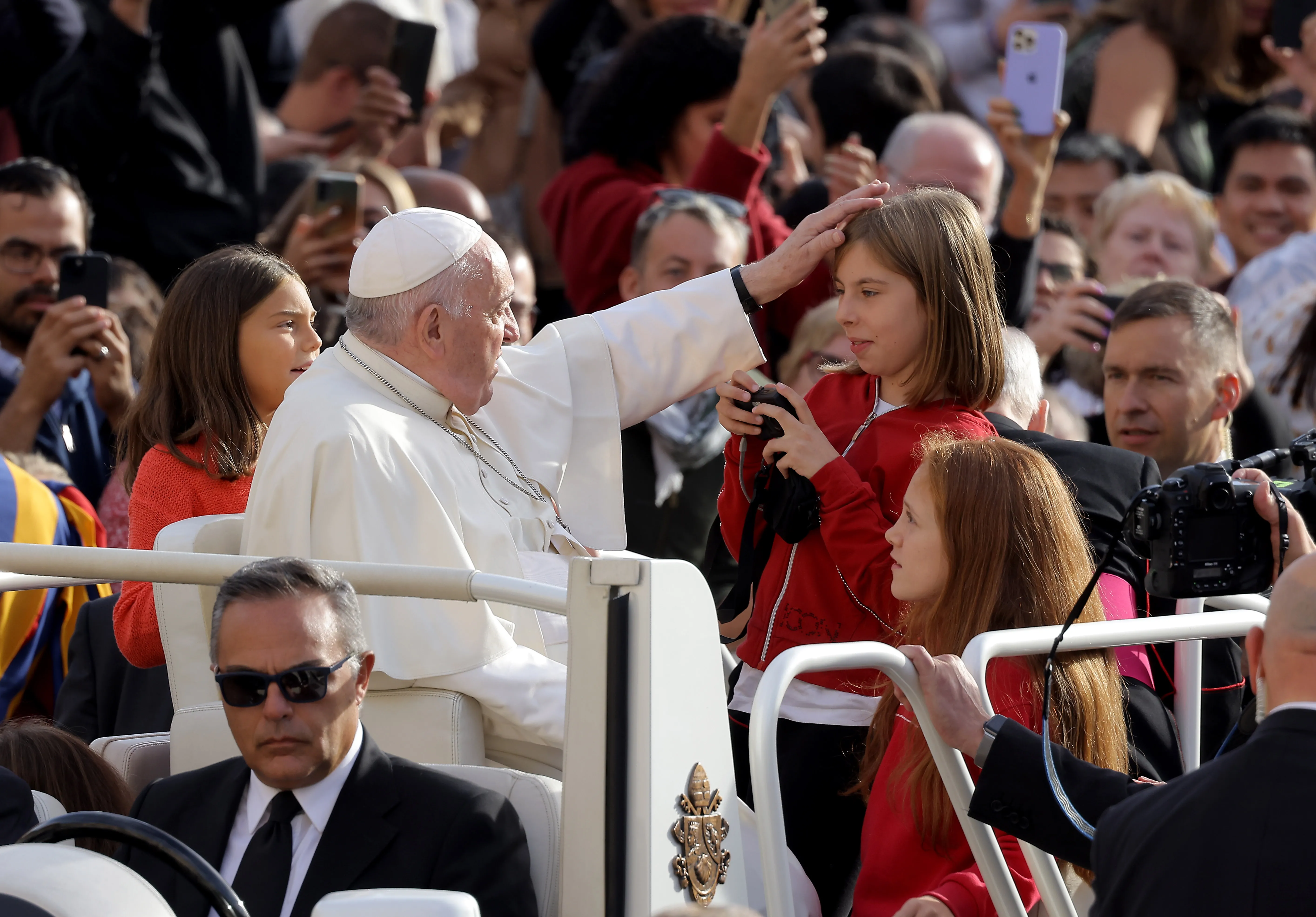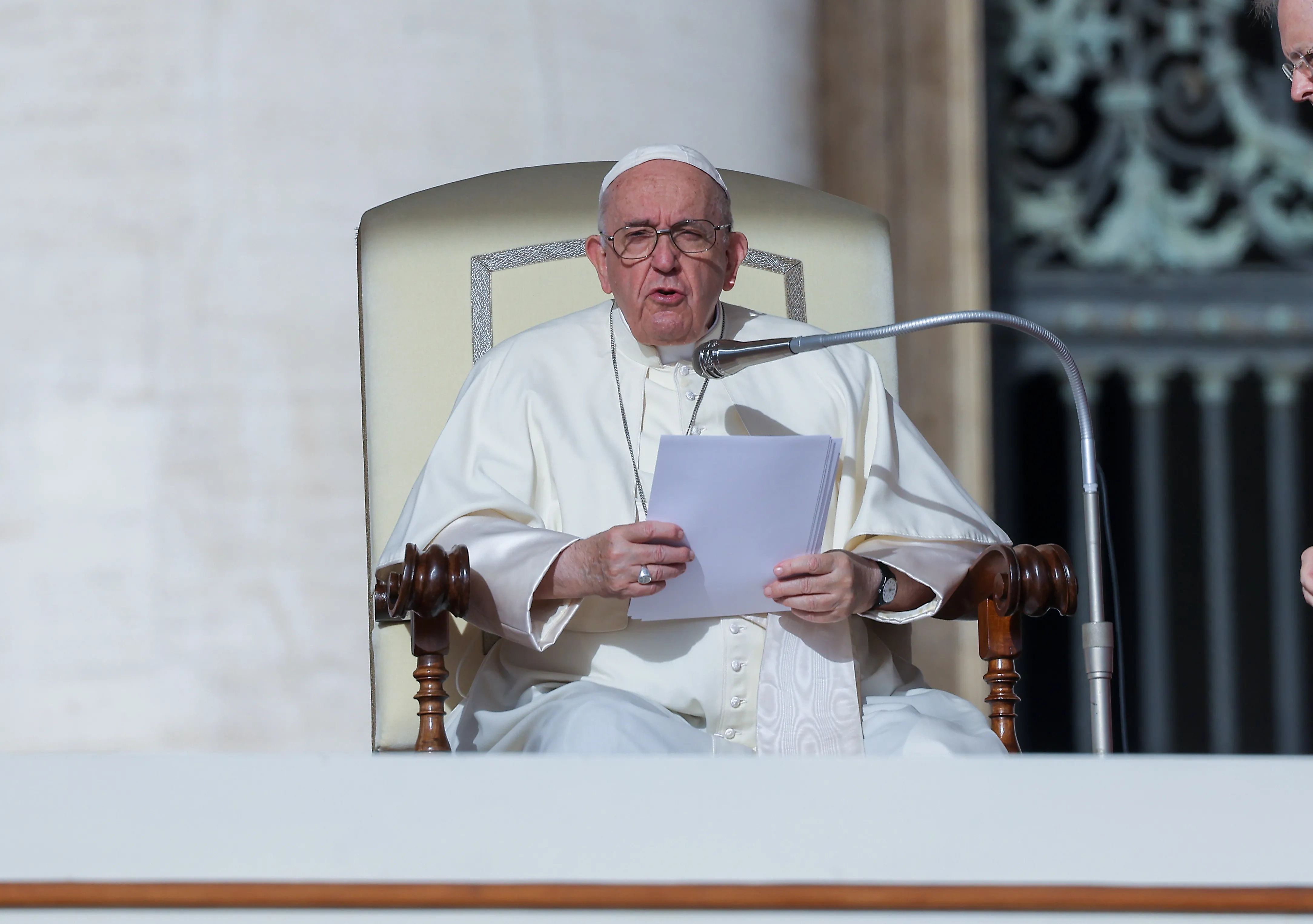
CNA Staff, Dec 16, 2023 / 11:49 am (CNA).
Judges delivered a verdict in the Vatican’s financial corruption trial on Saturday sentencing Cardinal Angelo Becciu to more than five years in prison and convicting five other defendants.
Becciu, the pope’s former chief of staff, is the highest ranking Vatican official ever to face a trial in the Vatican’s criminal court. The 75-year-old Italian cardinal was found guilty of several counts of embezzlement.
The cardinal was sentenced to five and half years in prison, a permanent disqualification from holding public office, and a fine equal to more than $8,000.
The Vatican court’s president, Giuseppe Pignatone, read aloud the verdict on Dec. 16 in the culmination of the nearly two-and-a-half-year-long saga of the Vatican’s “Trial of the Century,” which sat for 86 sessions.
Becciu’s lawyer, Fabio Viglione, told journalists on Saturday that the cardinal “will certainly appeal” the ruling.
Five other defendants were also sentenced to jail time, including Fabrizio Tirabassi, a former Vatican employee, and Enrico Crasso, a financial consultant for the Vatican, who were each given seven years in prison.
Italian businessman Gianluigi Torzi, who brokered the final stage of the London property at the center of the Vatican trial, received a six-year sentence, and Raffaele Mincione, the investment manager who owned the property, was given five years.
Cecilia Marogna, a Sardinian woman who was employed by Becciu as a security consultant, was sentenced to three years in prison.
Monsignor Mauro Carlino, a former official in the Vatican Secretariat of State, was acquitted in the trial.
Two other defendants, René Brülhart and Tommaso Di Ruzza, received fines of less than $2,000 and Italian lawyer Nicola Squillace received a suspended sentence of one year and 10 months.
Historic Trial of the Century’
The historic trial centered on what happened in and around the Secretariat of State’s 350 million-euro purchase of an investment property in London between 2014 and 2018.
The Vatican maintained that the deal was problematic and designed to defraud the Secretariat of State, the powerful curial department at the center of the investigation of financial malfeasance, of millions of euros.
The defendants in the trial were adamant that their actions were above board and that Vatican authorities were in the know.
Becciu, who used to work as the second-ranking official in the Vatican’s Secretariat of State, was charged with embezzlement, abuse of office, conspiracy, and witness tampering. Prosecutors asked for a prison sentence of seven years and three months, a fine of 10,329 euros ($11,236), and a ban from holding public office.
The cardinal has always denied all wrongdoing and claimed the financial deal was managed by his successor at the Secretariat of State, Archbishop Edgar Peña Parra.
Others involved also claimed there was no criminal liability in what took place — or they pointed the blame at parties whose names came up in investigations but who were never charged.
Defense lawyers were critical of the Vatican’s investigation and trial, calling it chaotic and lacking in respect for human rights and due process. One lawyer called for a mistrial.
Many of the 10 defendants, who maintained their innocence throughout the trial, will likely lodge appeals, so this may not be the final word in a trial that has seen a cardinal tried by lay judges for the first time.
This is a developing story.
If you value the news and views Catholic World Report provides, please consider donating to support our efforts. Your contribution will help us continue to make CWR available to all readers worldwide for free, without a subscription. Thank you for your generosity!
Click here for more information on donating to CWR. Click here to sign up for our newsletter.










Don’t worry Angelo! Francis will have you out in no time! Unless you happen to have conservative or traditional leanings. In that case, good luck in the big house.
To be sure, there were several stupid business dealings, like London. But where was the theft? And didn’t the Pope approve everything?
Will we ever know where the millions went in Australia? Cardinal Pell deserved to know. What a mess.
“Loans” to family members that didn’t have to be paid back under the rationale that it would be good for the local economies where they would spend the money. Sort of like Obamanomics.
Where do you send a Cardinal to jail?
A different angle on the story: prisons and apartments. Francis has broken with his predecessors who, as Bishops of Rome, used to celebrate Holy Thursday Evening Mass for the diocese in his cathedral, St. John Lateran. Francis has delegated that job to a substitute while he does his “peripheries” thing in assorted Roman jails. Except in 2021, when he celebrated that Mass in Becciu’s apartment (in the middle of his trial). So, maybe Becciu can serve his “sentence” under “house arrest,” “accompanied” to his apartment (unless the Pope kicks him out) by the Pope who insists on living in a hotel room. Maybe we had a preview of what “peripheral accompaniment” of a poor Cardinal means?
$11K fine for a cardinal who apparently lost millions? Good deal. Papal economics?
From From 10 Vatican City Facts You Didn’t Know:
Excerpt:
2. Vatican City Has No Prison
Vatican City is likely the only nation on Earth to not have a prison. The country does have a few cells for pre-trial detention. Those convicted and sentenced to imprisonment serve time in Italian prisons as per the Lateran Treaty. The costs for imprisonment are covered by the Vatican government.
P.S.: Will Becciu be removed from the College of Cardinals while he does his time? After all, Francis insists that sexual sins are not necessarily the most serious (which, in one sense, may be true), yet he laicized McCarrick.
I am growing convinced the Polish National Catholics under Hodur, in advocating for trusteeship, were right. In a normal, democratic society (e.g., Western societies where the state’s reach into the Church is limited) there should be clear lines of separation between finance and power, not the “corporate sole” nonsense that allows Bishops to do whatever they want with the money of the People of God. Require an accountability board the majority of whose members are NOT episcopally removable (at least immediately) to approve expenditures. THAT would (a) create financial transparency AND (b) end “clericalism” by taking away a significant clerical prerogative: unlimited financial decision-making. Next time some bishop babbles about “reform” and “declericalization as Pope Francis urges” ask him (and Francis) whether they’d be willing to sign on to this financial divestment. If you can’t get a “yes” or “no” (as opposed to qualificatiosn and equivocations), call out the hot air.
The answer is not schismatic Polish National Catholic-style lay trusteeship, especially with today’s vast majority of liberal and heretical Catholics-in-name-only who do not even recognize the Real Presence of Our Lord in the Blessed Sacrament. If one wants a sure recipe for disaster that is it. The answer is rather holy, orthodox, and traditional Catholic bishops and priests whose love is for Christ Crucified, not t
Power corrupts and absolute power corrupts absolutely. That includes absolute financial power. Ask the Apostolic Treasurer, Judas. Episcopal ordination does not remove those temptations.
There’s no need for the bishop to be the sole agent who disposes of Church’s funds. If the “People of God” are the Church, there’s no reason bishops should not have to convince other people to fund their projects. They may have total responsibility in teaching. That does not imply “one signature is enough” on checks.
Yes, let’s give “financial power” to the holy fornicating, shacking-up, contracepting, aborting, pro-homosexual, and transsexual “People of God” who every recent CARA survey shows are overwhelmingly the majority of modern American “Catholics”. Let’s have Paul and Nancy Pelosi and Joe and Jill Biden as the Apostolic Treasurers. Let’s add another downward spiral to the catastrophic state of the Catholic Church. Let patron saint be Judas since he is already their model.
Yes, I agree that establishing trusteeship is a big part of what would be an “actual reform in the Church.”
The fact that it doesn’t exist, and is not being vigorously pursued, puts the Church into the hands of frauds and thieves.
All the talk of “the reform” by the sitting Pontiff and his Cardinals and Bishops is rubbish until the true reform indicated by actions like trusteeship arrangements.
We continue to hear “poverty-pimping” about the Church’s “preferential option for the poor.”
It was voiced by “His Eminence” Beccui himself, on the night he stood on the balcony in Rome next to the Pontiff Francis, moments before his introduction to the world, he reminded the new Pontiff to “remember the poor.”
These characters are the supreme carnival…
Speaking of prosecuting the criminally stupid, did this show trial cost a million? How can anyone donate to this pontificate?
At least Cardinal Becciu will have housing and an assured means of sustaining his human needs. That’s more than Francis afforded Cardinal Burke. Maybe the best punishment for Becciu would be to kick him out into the streets, strip him of his financial support and tell him to get out of Rome and return to wherever he came from. I do have in mind one other bishop who ought to vacate the Vatican precincts.
Having been born on the island of Sardinia, Beccui likely could exist substantively on a small island. Where is there a small island large enough to accommodate a table, toilet, and a tall banana tree or two? Bergoglio could visit the island’s periphery, maybe even keep Beccui perpetual company. Such digs could well be their best before Someone requires the two to move one last time.
You’ve made my day!
What has become of the millions and the apartment in London?
Do these dignitaries pack them for their post-mortem trip?
Vanitas vanitaties and omnia sunt vanitas.
The Pope approved these stooges. They should all go to jail for not buying ETFs! A fool and his money are soon parted…🤦🏼♂️ (All this episcopal incompetence reminds me of how the Texas Bishops lobby in Austin, save Strickland…)
“Prosecutors allege the second broker, Gianluigi Torzi, hoodwinked the Vatican by maneuvering to secure full control of the building that he relinquished only when the Vatican paid him off 15 million euros (with the Pope’s approval!)… a British judge rejected Vatican requests to seize Torzi’s assets — it was a negotiated exit from a legally binding contract…Torzi’s whereabouts weren’t immediately known.”
Have they looked for Torzi in the Cayman Islands? Maybe he paid Cecilia Marogna to join him for her “intelligence services?” Who knows, maybe they are with Australian friends, trying to free a nun on Seven Mile Beach?
What do you get for misleading the faithful into heresy? Mortal sin?
Jesus came to save the sinner, lest we forget.
There is that warning about leading the little ones to sin and a millstone would have been a better option
If the result is unfair may the Holy Father catch it in time and commute the sentence or quash the conviction.
This is beyond disgraceful, whoever is responsible – Becciu or Parra.
Has there been any comment from the Pope about this?